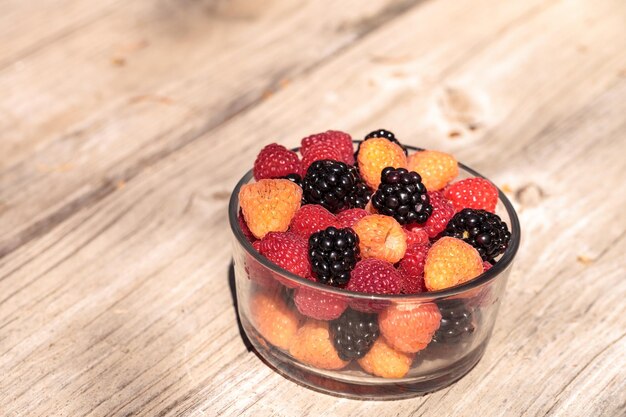Maximizing the Shelf Life of Blackberries in the Refrigerator: Tips and Insights
Imagine opening your refrigerator to discover a punnet of vibrant blackberries, plump and ready to burst with juiciness. Blackberries, with their delightful tartness and rich color, can elevate any meal or snack. But if stored incorrectly, their freshness can quickly fade, leaving you with a mushy, unappetizing mess. This guide will explore how long blackberries last in the refrigerator, focusing on optimal storage practices, factors impacting freshness, and practical tips for prolonging their life.
📅 How Long Do Blackberries Last in the Refrigerator?
Blackberries are a delicate fruit with a naturally brief shelf life. When properly stored in the refrigerator, blackberries typically last 3 to 5 days. However, this time frame can fluctuate based on storage methods and the berry’s initial ripeness.
Factors Influencing Blackberry Freshness
Initial Ripeness: Blackberries that are nearly overripe at purchase will not last as long as those picked slightly underripe. Choosing fresh, firm blackberries can extend their usability.
Storage Conditions:
- Temperature: Maintaining a consistent refrigerator temperature is vital. Ideally, blackberries should be stored at temperatures between 32°F and 40°F (0°C to 4°C).
- Humidity: Proper moisture levels can also affect shelf life. Too much humidity can accelerate spoilage, while too little can cause drying.
Handling and Transport: Rough handling can bruise berries, reducing their shelf life. Gentle transport and minimal handling help maintain their structural integrity.
🖼️ Optimal Ways to Store Blackberries
While refrigeration is a standard storage method, a few best practices can enhance the fruit's longevity.
1. Do Not Wash Before Storage
Washing blackberries before refrigerating can introduce moisture that speeds up spoilage. It's best to wash them just before consumption.
2. Use Proper Containers
Choose containers with ventilation: Packaging blackberries in a breathable container, like a vented plastic box or open-top container, minimizes mold growth by allowing air circulation.
Line with paper towels: Placing a paper towel at the bottom of the container absorbs excess moisture, protecting the berries from becoming soggy.
3. Avoid Overcrowding
Overcrowding leads to bruising and accelerates spoilage. It's advisable to store blackberries in a shallow layer to reduce damage and maintain freshness.
🍇 Recognizing Spoiled Blackberries
Knowing when blackberries are no longer fit to eat is as crucial as understanding how to store them. Indicators of spoilage include:
- Mold Formation: Even a small presence of mold means it's time to discard them.
- Texture Changes: Avoid blackberries that feel overly soft or mushy.
- Off Smell: A sour or fermented odor indicates that berries are past their prime.
❄️ Can You Freeze Blackberries?
Freezing blackberries is an excellent option for extending their usability beyond a few days. Blackberries can be frozen for up to a year without significant loss of flavor or nutrition. Here’s how:
- Wash First: Unlike refrigeration, wash and dry thoroughly before freezing.
- Single Layer Freeze: Spread berries in a single layer on a baking sheet and freeze until firm.
- Transfer to Airtight Container: Once frozen, store them in airtight bags or containers.
Uses for Frozen Blackberries
- Smoothies: Add a handful of frozen blackberries to smoothies for a refreshing, nutritious boost.
- Baking: Incorporate frozen blackberries in muffins or cakes for a tart pop of flavor.
- Sauces and Jams: Simmer with sweeteners for homemade blackberry sauce or jam.
🍽️ Creative Ways to Use Fresh Blackberries
While fresh, enjoy blackberries in a variety of culinary applications:
- Salads: Toss into spinach or arugula salads for a bold fruit contrast.
- Breakfast Bowls: Combine with yogurt, oats, or granola.
- Cocktails: Muddle with mint and lime for a refreshing summer drink.
Blackberry Nutritional Highlights
Blackberries are not just versatile but also packed with essential nutrients:
- Rich in Vitamins: Notably vitamins C and K.
- High Fiber Content: Beneficial for digestive health.
- Antioxidant Properties: Known for promoting cellular health.
📝 Quick Tips for Blackberry Storage and Use
Here’s a summary of key takeaways and tips for storing and using blackberries effectively.
- 🧊 Refrigerate immediately upon bringing them home, ideally keeping them between 32°F and 40°F.
- 📦 Store in a breathable container with a paper towel at the bottom to manage moisture.
- 🚫 Do not wash until ready to eat to prevent early spoilage.
- ❄️ Freeze for long-term storage — perfect for smoothies and baked goods.
- 🍽️ Experiment with fresh blackberries in salads, desserts, or cocktails for varied culinary delights.
By following these tips, you can optimize the shelf life of your blackberries, minimizing waste and maximizing enjoyment. Whether indulging in their natural form or creatively incorporating them into meals, blackberries can remain a refreshing and versatile staple in your kitchen.
Closing Thoughts
Understanding how to effectively store and manage blackberries not only reduces wastage but enriches your culinary repertoire with a rich, nutritious fruit. By paying attention to their unique storage needs, you ensure that these berries bring their delightful punch to your palate for as long as possible. Always remember the unique characteristics of blackberries — their delicate nature, nutrient density, and versatility make them a cherished fruit worth the mindful storage effort. Enjoy them fresh, frozen, or as a sumptuous addition to your favorite recipes.

